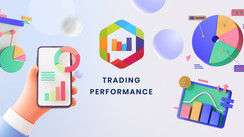Contrary to what you might think, you share more similarities with a top-notch hedge fund manager than you realize. The key distinctions lay in the size of your trading portfolio and your capacity to manage your emotions effectively. Leading fund managers worldwide embarked on a journey akin to yours. They, too, had to acquire trading skills, refine their strategies, and gain mastery over their emotions to excel in the financial markets. The capacity to control one's feelings and actions in the market truly distinguishes seasoned professionals from novices.
With adequate screen time and perseverance, nearly anyone can develop the competence to accurately predict market trends. However, it's imperative to note that prediction proficiency alone does not guarantee success.
Emotional Intelligence in Trading
Seasoned traders distinguish themselves by their ability to view each trade as another application of their strategy, devoid of emotional ties. Handling billion-dollar hedge funds is not a task for the faint-hearted.
The only way to effectively manage such colossal sums and meet the expectations of high net-worth clients is by mastering your emotions and market conduct. It's crucial to remember that, in the end, it's all about numbers.
Successful trading hinges on your ability to modify your perception of the funds in your trading account. Professional traders view their accounts as scoreboards in a global game. To them, account balances are mere numbers on a screen—the more zeros that follow the initial digits, the better they're performing.
Imagine managing a billion-dollar position in the same way you would handle a $1,000 position. The key to this approach is realizing it's just numbers; they are merely digits on a screen. If you allow yourself to truly feel the magnitude of the money involved, you're setting yourself up for failure.
Developing a Winning Trader's Mindset
Your greatest asset as a small-scale retail trader is your ability to remain unaffected by potential losses in your account. Achieving this requires:
- Trading only with funds you can afford to lose
- Being aware of your net worth and liquid assets after debt
- Risking a tiny fraction of your liquid assets per trade
- Passing the "sleep test" - if your current position doesn't disturb your sleep, you're on the right track
With these principles in mind, the final step towards thinking like a hedge fund manager involves altering your perspective about the money you're trading.
Trading with another person's money can be more nerve-wracking than trading with your own. A successful hedge fund manager requires the cool composure of a seasoned professional to secure above-average returns for their clients.
Trading with a Big Account Mindset
This is achieved by viewing the money in your trading account as mere numbers. By detaching emotions from trading decisions, even traders with significantly large accounts can operate as if they're dealing with a demo account.
Have you ever made successful trades on a demo account, only to struggle when transitioning to a real account? This usually happens because you let the real money dictate your actions instead of maintaining control over your perception of it.
Taking control of your money is a key aspect of trading success. It might sound like a motivational cliché, especially after a streak of trading losses. However, your mindset significantly impacts your trading performance.
In trading, you must adopt the "fake it till you make it" mindset to maintain consistency and discipline in your approach.
Emulating the Strategies of a Hedge Fund Trader
When emulating the strategies of a hedge fund trader, you should take into account the following factors:
Macro Analysis
Hedge fund managers dedicate a significant portion of their time to macroeconomic analysis. They examine large-scale global economic trends to predict their impact on various asset classes. They consider factors such as GDP, inflation rates, unemployment, trade balance, and political stability across different countries.
Fundamental Analysis
In addition to macroeconomic analysis, hedge fund traders also utilize fundamental analysis. This involves evaluating an asset's intrinsic value by considering underlying financial and economic factors. For example, in the case of stocks, they assess the company's financial health, industry position, and management quality, among other things.
Technical Analysis
Though primarily reliant on macroeconomic and fundamental analysis, hedge fund traders also employ technical analysis to time their entries and exits. They use price action and chart patterns to predict future price movements.
Risk Management
Another key strategy used by hedge fund managers is stringent risk management. They carefully calculate the risk-reward ratio for each trade and ensure it aligns with the fund's overall risk tolerance. This approach includes setting stop losses and profit targets for each position to manage potential losses effectively.
Patient and Disciplined Trading
Patience and discipline are key virtues of successful traders. Here's how you can develop these attributes:
Adopting a Long-Term Perspective
Successful traders take a long-term view of the market. They understand that significant profits are rarely made overnight and that the path to consistent returns is slow and steady growth. This approach involves resisting the temptation to over-trade and waiting patiently for high-quality trade setups.
Sticking to Your Trading Plan
Discipline in trading means developing and sticking to a trading plan. This plan should outline your trading strategy, risk management rules, and specific conditions for entering and exiting trades. By adhering to your plan, you can make informed decisions and avoid impulsive actions prompted by fear or greed.
Emotional Control
Trading involves dealing with uncertainties and high levels of risk, which can trigger strong emotions. Successful traders manage their emotions and maintain composure, even during turbulent market conditions. By doing so, they prevent emotional reactions from influencing their trading decisions.
Wrapping Up
Trading like a hedge fund manager requires a shift in mindset and a commitment to disciplined, patient trading. It's about understanding the financial markets at a macro level, evaluating assets through fundamental analysis, and timing trades with technical analysis.
Remember, trading is not a get-rich-quick scheme but a marathon that requires persistence and emotional resilience. The ability to manage risks effectively, coupled with the discipline to stick to a well-formulated trading plan, forms the bedrock of successful trading.
Finally, know that the journey of a trader is not devoid of setbacks. It's essential to treat each loss as a learning opportunity and continually refine your trading approach. It's this continuous learning and evolution that truly define a successful trader.
In conclusion, aim to emulate the mindset and tactics of a hedge fund manager. By doing so, you're setting yourself up for consistent long-term gains and success in the financial markets.





